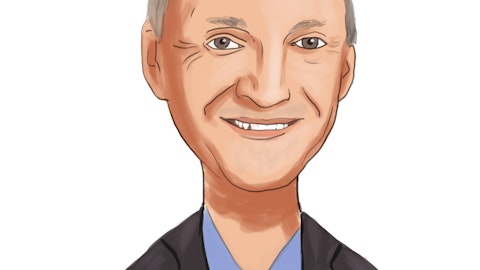Vinay Bassi: Yes. So Stephanie, I feel bookings is a great metric, because it is effort and reward of our own that we are reflecting. NPR, I just wanted to take a little more time to do the homework of understanding the ins and out, because like everyone else, a portion of our NPR data is relied on third-party inputs. And when it’s not in our control, knowing how the out — inputs come in, what’s the cadence, I just want to do that homework a little bit longer to just make sure I understand what are the ins and out and how is that a leading indicator for me. So that’s the reason why you didn’t see it in this, but bookings, which is obviously deals closed is a great indicator for us for the time being.
Stephanie Davis: Seems that helpful. Looking forward to see the metrics. Thank you guys.
Chris Fowler: Thanks Stephanie or Jesse, which ever it is.
Operator: Our next question comes from George Hill with Deutsche Bank. Please proceed with your question.
Unidentified Analyst: Yes, hi. It’s [indiscernible] on for George. Thanks for taking the question. Can you talk a little bit about what has changed in outsourcing conversations lightly with prospective clients just given the recent macro environment?
Chris Fowler: Yes. I’m sorry, I didn’t catch your name. So — but I’ll answer the question. I did hear most of that. What I would say is, definitely, we’re seeing the increased interest, and that is based on — as I said in the prepared remarks, the pressure on the labor market specific to the communities that we’re serving. And secondly, as the reimbursements continue to get complex — more complex, the need for the specialized skills and continuing to stay on top of that, it continues to ratchet up. And to give an example of that, if you go back five years ago, the vast majority of these hospitals were their payments were on the backs of traditional Medicare, Medicaid, and probably a Blue Cross was going to make up the vast majority of their payments and a pretty straightforward payment model that they were getting reimbursed on and also getting paid within 14 to 17 days.
While it may not be the dollars that they want to get, they were — they knew the money that they were going to get. They knew in the time that they would get it and they could budget for that. What’s happened is you’ve seen this kind of proliferation of the move to the Medicare Advantage or the value-based care model, it’s created more complexity and making a little — not quite so straightforward in getting that money in. So it’s about, again, having the resources, one, that are available, just the bodies and the chairs. And then secondly, making sure that they’re able bodies and that they’re on top of the changing landscape of how that reimbursement is. So that’s really where the vast majority of the conversation has shifted to. And again, as we have — this is what we do.
We live and breathe by this specifically with more than half of our business. And so we’re able to sell the success that we’ve had with our 20-plus years of experience to be able to bring that consistency and success into the delivery for those opportunities.
Operator: It appears that there are no further questions at this time. I would now like to turn the floor back over to Chris Fowler for closing comments.
Chris Fowler: Well, thanks, everybody, for joining us. Also, thank you for the patience with our technical difficulties. Hopefully, that will be a onetime and only. And obviously, thank you to the new copilot that we’ve got sitting with us. Vinay Bassi, and looking forward to go and finish in this transformation and continuing the progress that we’ve started here at CPSI, soon to be TruBridge on Monday. But Hope everybody has a wonderful rest of your day and good weekend. And thank you again for your support in our company. Bye-bye. Thank you.
Operator: This concludes today’s teleconference. You may disconnect your lines at this time. Thank you for your participation.
Follow Trubridge Inc. (NASDAQ:TBRG)
Follow Trubridge Inc. (NASDAQ:TBRG)
Receive real-time insider trading and news alerts




